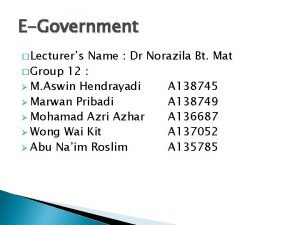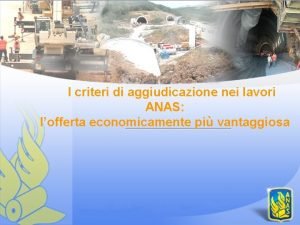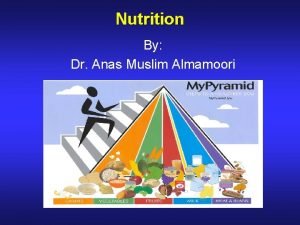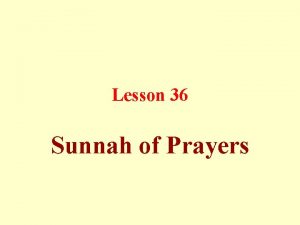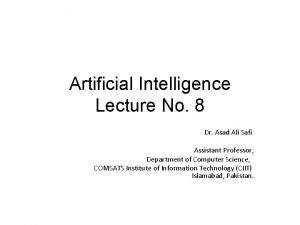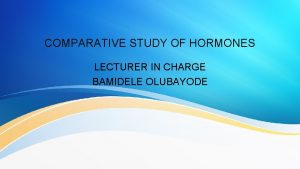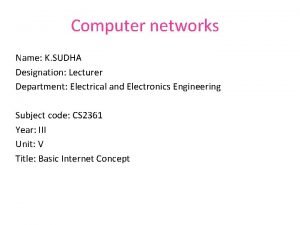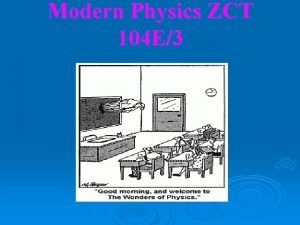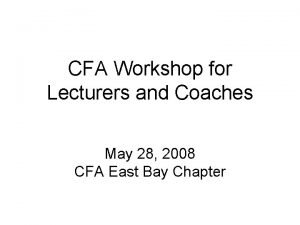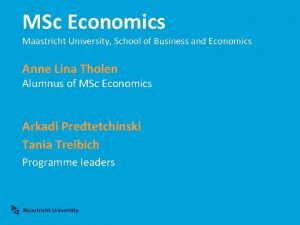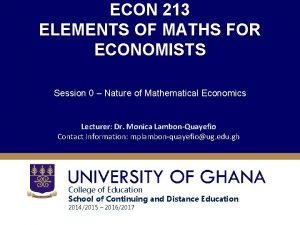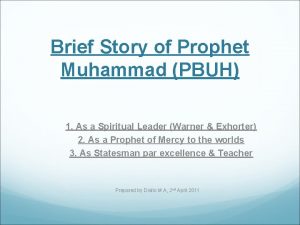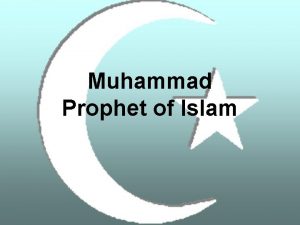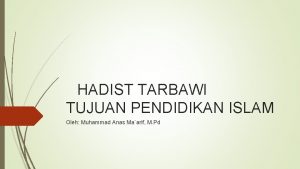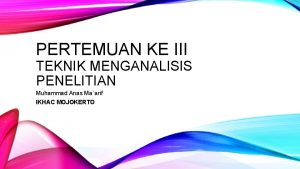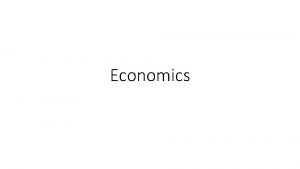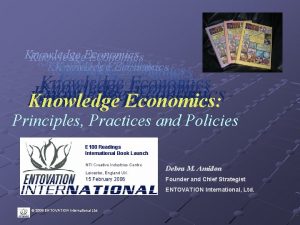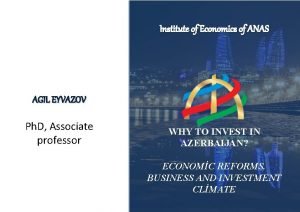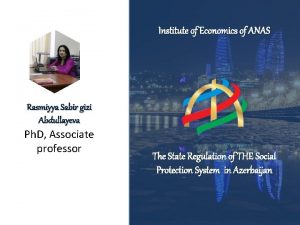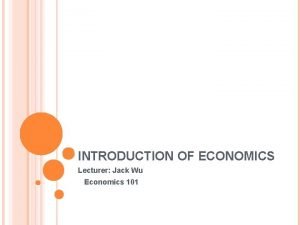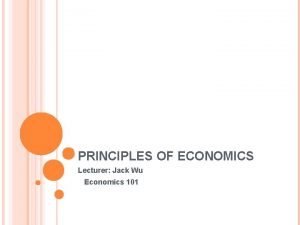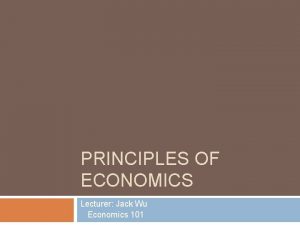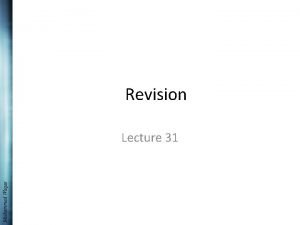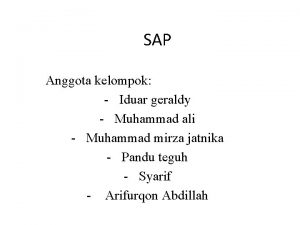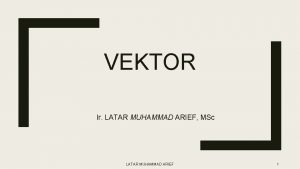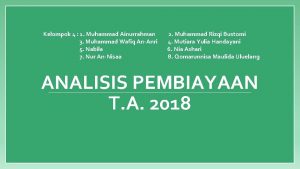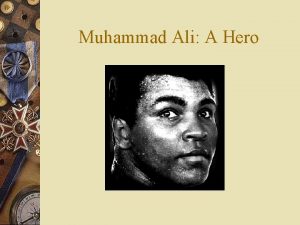What is Economics lecturer Muhammad Anas Zarka Professor



























- Slides: 27

What is Economics lecturer: Muhammad Anas Zarka (Professor, Senior advisor, Shura Sharia Consultancy, Kuwait, 12 Oct 2010 = 4 Zul Qidah 1431 H

Prerequisites: • I assume participants had at least two introductory courses in conventional economics, and familiarity with basic Islamic Sharia and fiqh concepts.

Lecture Objectives: • To demonstrate the relevance of Islamic economic rules and goals to conventional economics; and vice versa : the relevance of conventional economics to some Islamic rules and goals.

Definitions: • Islamic rules are the do’s and don’ts which we derive from Sharia (The Quran, and authentic Sunnah) and from the fiqh. • Islamic goals : I discuss later only the top three primary goals, all explicitly stated in The Quran. There are other goals, primary and derived, which are not addressed in this lecture

Islamic economic goals : • Fulfillment of Basic needs of every member in society. • Reduction of Income and wealth inequality. • Attainment of economic power and independence

Economics Defined • economics is a social science. . • It studies the production of goods and services • Their distribution ( how they are shared among members of society ) • The consumption of goods and services

What are the main components of Economics? • Economic analysis • economic systems • Economic Policies

Economic analysis • It describes economic reality and classifies it into useful categories, • then tries to discover economic laws ( stable relationships of cause – effect among economic variable s ). • Analysis is the “ descriptive , or positive “ component of economics

economic systems • An economic system is a set of NORMS (GOALS , RULES and INSTITUTIONS ) which society prefers to observe in its economic life. Thus a system is the normative part of economic life. • Islamic Sharia is the source of an Islamic economic system.

Comparative economic systems • This used to be one main part of Western economics textbooks , but has now disappeared. Why? • “End of History” attitude, now shattered by the financial crisis.

Economic Policy • This is the study of ways by which we can move from one economic situation to another which is closer to society’s goals. • Any economic policy can NEVER be totally objective ( depends only on economic analysis of cause –effect ). It must also have a “value component” which is derived from the system we prefer.

Islamic Economic Goals • These can be derived from Sharia, and are subject to IJTIHAD. • I select for this lecture only Three primary goals. • I list and may refer a little to other derived goals. They are worthy of your further consideration.


Goal Two Reduction of inequality • Reduction of Income and wealth inequality. 59: 8 • }ﻛﻴﻼ ﻳﻜﻮﻥ ﺩﻭﻟﺔ ﺑﻴﻦ ﺍﻷﻐﻨﻴﺎﺀ ﻣﻨﻜﻢ { ﺍﻵﻴﺔ • {. . so that it [wealth] may not merely circulate between the rich among you } 59: 8 • As far as I know, Islam is the only religion whose Holy Book explicitly states such goal.

Goal Three power and independence • Attain economic power • Attain economic independence (‘izzah )ﻋﺰﺓ 8: 60 • } ﻭ ﺍ ٱ ﻥ { – ﺍﻻﻧﻔﺎﻝ • 63: 8 } ٱ ﻭ ﻳ { ﺍﻟﻤﻨﺎﻓﻘﻮﻥ

Goal Three Explained -1 power and independence • Economic Power means ability to do and achieve what you want in economic life. It is relative to what others can do. • Economic Independence from others means. . .

Other Derived Goals • Economic Efficiency • Generation of economic surplus to support furuz kifaya ( socially obligatory duties) • Full employment • Economic development

The Method of this lecture • Select a conventional economic issue or concept • Explain it briefly when necessary • Check its relevance to Islamic economic goals • Check its relevance to Islamic economic rules

MICRO-ECONOMIC Issues • Scarcity : fact or fiction? Does it persist if Sharia is fully applied? • Consumer behavior : moderation- israaf – taqteer – tabzeer. • Consumer Utility • Efficiency : is it a Sharia goal? • Types of The business Firm. • Firm’s Objectives : the Profit maximization issue

MACRO-ECONOMICS-1 • Aggregate Income and its components : Consumption, savings and Investment, Exports , Government expenditure. • Macro economic statistics : Their Sharia importance.

MACRO-Issues -2 • Growth and Development. • Physical capital and human capital as necessary factors. • Knowledge as capital. Its special properties: cumulative , non-exclusive( same as public goods). No depreciation. Not subject to diminishing returns?

Social capital • Meaning • Great significance to economic efficiency and development. • Emphasis by the institutional school in economics. • Very close to concept of (salahu zati al-bayni ). • Worthy of further research. Social justice

Distribution -1 • Factor incomes -the functional distribution: wages , income from property, profits • The personal distribution. Monitoring poverty • Sharia approach to both distributions is very different.

Interest income= usury • Usury : any stipulated increase above the principal of a loan is a strictly prohibited income. • Financing by Sharia compliant commercial transactions generates halal income which is integrated with exchange, hence is part of profits.

The motto of Islamic economics • } ﺍ ﻱ ﺍ ﺍ ﻱ ٱ ٱ ﺍ ٱﻠ ﺍ ﺍ ﻯ ﻳ 70 /17 • Verily we have honored the Children of Adam. We carry them on the land the sea, and have made provision of good things for them, and have preferred them above many of those whom We created with a marked preferment. Al Quran 17: 70 - ﺍﻻﺳﺮﺍﺀ - { ﺍ ﻳﻼ

The Motto implications • From this Ayah, and the fact that some persons cannot produce sufficient income to fulfill their basic needs, you can logically derive the first and second goals of Islamic economics, and many others. • The Ayah is universal: provision of any useful good or service to any human being fulfils a Divine goal, hence has intrinsic moral value in Islam.

Wa al Salaam. Alaikum
 Lecturer's name or lecturer name
Lecturer's name or lecturer name Anas nashif
Anas nashif Anas alami ophtalmologue
Anas alami ophtalmologue Pdm anas
Pdm anas Dr anas alami
Dr anas alami Dr anas khan
Dr anas khan Madiha anas
Madiha anas Dua ya tahiyyatu
Dua ya tahiyyatu الباح
الباح Promotion from assistant to associate professor
Promotion from assistant to associate professor Spe distinguished lecturer
Spe distinguished lecturer Lecturer asad ali
Lecturer asad ali Good afternoon my dear students
Good afternoon my dear students Guest lecturer in geography
Guest lecturer in geography Lector vs lecturer
Lector vs lecturer Lecturer name
Lecturer name Photography lecturer
Photography lecturer Lecturer in charge
Lecturer in charge Physician associate lecturer
Physician associate lecturer Designation lecturer
Designation lecturer Lecturer in charge
Lecturer in charge Pearson lecturer resources
Pearson lecturer resources Cfa lecturer handbook
Cfa lecturer handbook Spe distinguished lecturer
Spe distinguished lecturer Designation of lecturer
Designation of lecturer School of business and economics maastricht
School of business and economics maastricht What is mathematical economics
What is mathematical economics Brief story of prophet muhammad
Brief story of prophet muhammad
